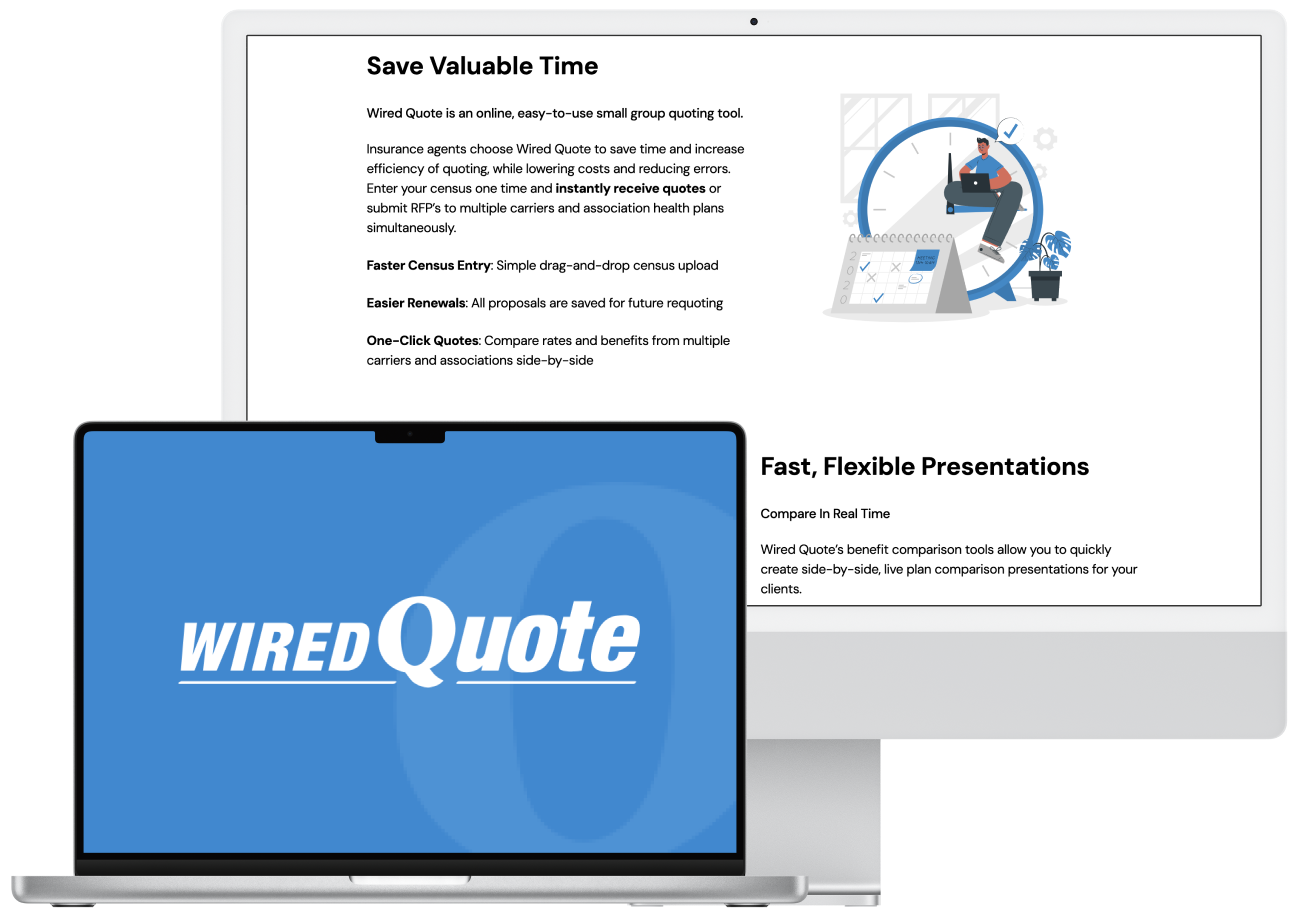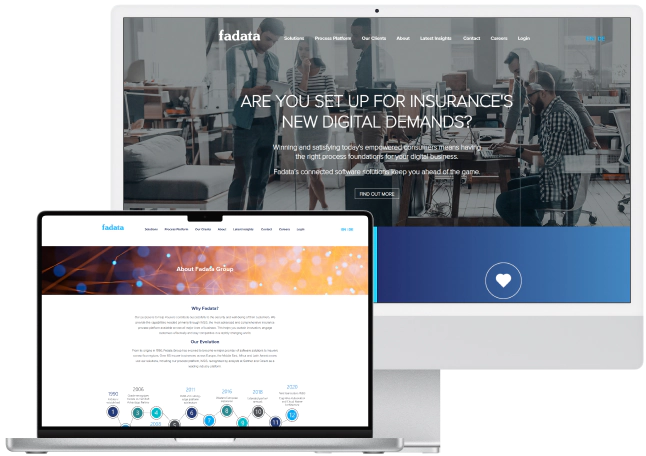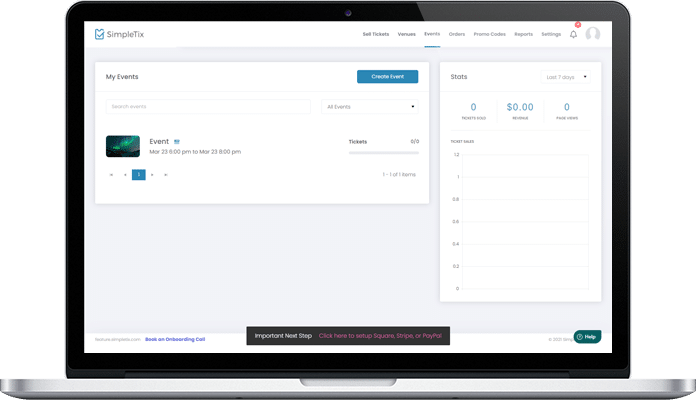What we offer
DICEUS is a custom software development company that has provided testing and QA services for over 10 years. Our QA specialists and test engineers have ISTQB certificates, which proves their professional credibility and high level of quality assurance expertise. Since 2011, we have accomplished 130 projects for such industries as fintech, banking, insurance, healthcare, etc. Thus, our manual and automation test experts have a good understanding of various business domains and their specifics. Here’s the list of test types we offer accessibility testing, compatibility testing, compliance testing, exploratory testing, functional testing, penetration testing, performance testing, regression testing, release testing, security testing, and usability testing.
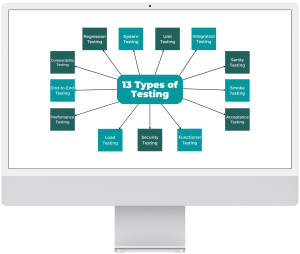
Manual testing
Under this umbrella term, a whole bunch of testing procedures lurk, such as usability, error handling, user acceptance, UI, installation, and other types of checks. As a rule, they are applied to analyze and assess apps of all kinds and adopt an end user’s perspective in dealing with such software solutions.
Automated testing
This process allows specialists to radically reduce development time and control the quality of every step in the software creation pipeline. Like the previous type, automation software test service embraces several methods, including unit, input-output, performance, integration, regression, security testing, and more.
Various types of testing
In addition to the two basic kinds of software test services, our company also performs multiple testing procedures that are employed both during software evolution (for instance, exploratory or compliance testing) and during software development (such as accessibility, compatibility, localization, and functional testing).
Penetration testing
Cyber security is a chief concern of modern digitally driven businesses and individuals. To address the challenges posed by cyber criminals, experts of DICEUS expose vulnerabilities of software solutions, databases, and infrastructure to protect them against unauthorized access and minimize the threats of sensitive and financial data leakages.
QA as a service
Software must be safe. It should display a high level of quality so that its users can rely on it to operate seamlessly and deliver the best results. Our QA service team provides an entire gamut of respective measures to handle end-to-end QA processes and guarantee the satisfaction of our customers.
Testing as a service
If you want to have your solution tested inside out, DICEUS can do it for you. We will not only execute all necessary tests but also create a plan for the process, provide tools and frameworks for it, and present you with the results manifesting the bottlenecks and suggesting remedial measures to remove flaws.
Ensuring the smooth and safe performance of your software is the key to its efficient employment, which in its turn promotes the productivity of your organization and the security of its assets. Such an outcome can be obtained only if you put it to an in-depth and all-encompassing testing procedure.
The seasoned mavens of DICEUS have sufficient expertise and adequate technology roster to provide the entire complex of QA testing services that will leave no stone unturned on the way to protecting all the elements of your digital environment and supporting its seamless performance under any working conditions.
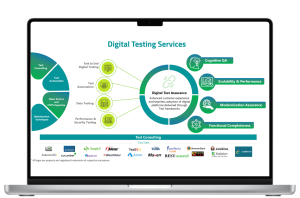
Benefits of software testing and QA services from DICEUS
In the age of across-the-board digitalization, organizations critically rely on software solutions in their workflow. However, not all stakeholders realize the fact that these products can do more harm than good if their quality and security are substandard. By commissioning software QA service and testing procedures of various kinds, you can usher in the following perks.
We extend our software testing services to a wide gamut of solutions, including apps of all kinds, data warehouses, enterprise and SaaS software, IoT and blockchain solutions, e-commerce websites, etc.
Our quality assurance and testing process
Our decade-long experience in rendering testing and quality assurance services to customers across various industries and solutions enabled us to devise a universal roadmap for handling such tests that guarantees a smooth process and high-quality results. It covers four basic steps.
What impacts your project duration
Determining the time, the implementation of your project is likely to take requires the awareness of such elements:
- Project requirements
- Expected deadlines
- Team size
- Necessary tools and platforms
- The complexity of tasks to perform
What affects your project costs
The budget you must allocate to see the project through depends on:
- Onboarded technologies and tools
- Project size and complexity
- Engagement model (Dedicated Team, Time and Material)
- The urgency of project implementation
- Time the testing will take
What we need from your side
Some customers think that their job is done when they give testers access to their software. However, they can hardly expect fast and efficient testing to be conducted if their cooperation efforts stop at that threshold. The speed and quality of the QA and testing process will be remarkably enhanced if you provide:
- Project objectives, vision, and roadmap (if available)
- High-level project requirements
- Project-specific documentation of any kind (software architecture, mockup, etc.)
- Project deadlines
- The schedule of your availability (a couple of hours a week) to hold requirements gathering sessions
Our tech stack





























































Explore our case studies
Frequently asked questions
What is the difference between QA and software testing?
They are closely bound together, and one typically accompanies the other. The ultimate goal of both procedures is obtaining a bug-free and functional solution. Yet, there is a difference between them. Quality Assurance is understood as a systematic approach to the development process that is called to ensure the utmost efficiency of the lifecycle so that the final product lives up to the expectations of stakeholders. Software testing comes into play at the later stages of product development and focuses on identifying and eliminating bugs and glitches in it.
What is the difference between manual and automated testing?
The very names are symptomatic. Manual testing is a slower procedure performed by a person without any scripts or tools when (s)he moves set by step while checking the solution. Its chief objective is to detect bugs and flaws in the software product before its deployment. By contrast, automated testing relies on special frameworks and other programs to accomplish the job. It is faster and more efficient since it can embrace more test cases over a short time.
What are the different types of testing?
Depending on the criterion you adopt, testing types may be differentiated in accordance with the chosen approach (manual or automated), the solution you check (app testing, SaaS software testing, IoT product testing, blockchain solution testing, data warehouse testing, etc.), or the nature and goal of the procedure (penetration testing, unit testing, functional testing, compatibility testing, regression testing, security testing, and more).
